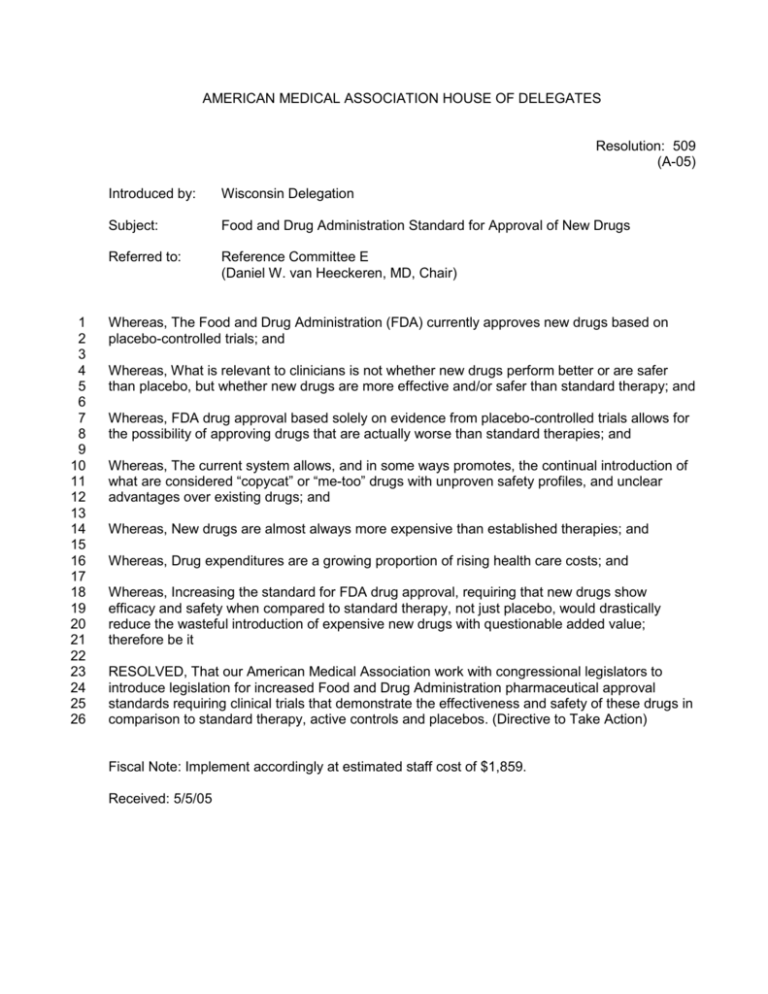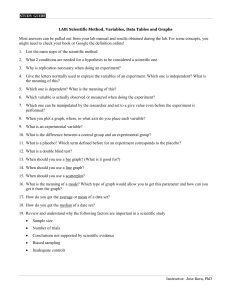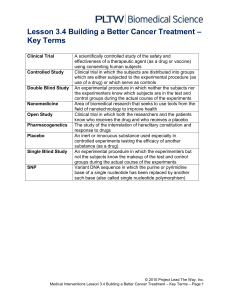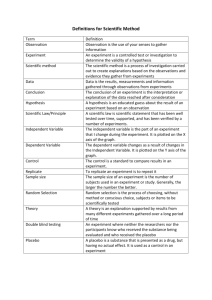509 - American Medical Association
advertisement

AMERICAN MEDICAL ASSOCIATION HOUSE OF DELEGATES Resolution: 509 (A-05) 1 2 3 4 5 6 7 8 9 10 11 12 13 14 15 16 17 18 19 20 21 22 23 24 25 26 Introduced by: Wisconsin Delegation Subject: Food and Drug Administration Standard for Approval of New Drugs Referred to: Reference Committee E (Daniel W. van Heeckeren, MD, Chair) Whereas, The Food and Drug Administration (FDA) currently approves new drugs based on placebo-controlled trials; and Whereas, What is relevant to clinicians is not whether new drugs perform better or are safer than placebo, but whether new drugs are more effective and/or safer than standard therapy; and Whereas, FDA drug approval based solely on evidence from placebo-controlled trials allows for the possibility of approving drugs that are actually worse than standard therapies; and Whereas, The current system allows, and in some ways promotes, the continual introduction of what are considered “copycat” or “me-too” drugs with unproven safety profiles, and unclear advantages over existing drugs; and Whereas, New drugs are almost always more expensive than established therapies; and Whereas, Drug expenditures are a growing proportion of rising health care costs; and Whereas, Increasing the standard for FDA drug approval, requiring that new drugs show efficacy and safety when compared to standard therapy, not just placebo, would drastically reduce the wasteful introduction of expensive new drugs with questionable added value; therefore be it RESOLVED, That our American Medical Association work with congressional legislators to introduce legislation for increased Food and Drug Administration pharmaceutical approval standards requiring clinical trials that demonstrate the effectiveness and safety of these drugs in comparison to standard therapy, active controls and placebos. (Directive to Take Action) Fiscal Note: Implement accordingly at estimated staff cost of $1,859. Received: 5/5/05 Resolution: 509 (A-05) Page 2 RELEVANT AMA POLICY H-100.992 FDA (1) Our AMA reaffirms its support for the principles that: (a) an FDA decision to approve a new drug, to withdraw a drug's approval, or to change the indications for use of a drug must be based on sound scientific and medical evidence derived from controlled trials and/or postmarket incident reports as provided by statute; (b) this evidence should be evaluated by the FDA, in consultation with its Advisory Committees and expert extramural advisory bodies; and (c) any risk/benefit analysis or relative safety or efficacy judgments should not be grounds for limiting access to or indications for use of a drug unless the weight of the evidence from clinical trials and postmarket reports shows that the drug is unsafe and/or ineffective for its labeled indications. (2) The AMA believes that social and economic concerns and disputes per se should not be permitted to play a significant part in the FDA's decision-making process in the course of FDA devising either general or product specific drug regulation. (Res. 119, A-80; Reaffirmed: CLRPD Rep. B, I-90; Reaffirmed: Sunset Report, I-00) H-460.934 Ethical Use of Placebo Controls in Clinical Trials The controversy that surrounds the use of placebo controls in research is particularly intense when the experimental drug is designed to treat conditions for which known effective therapies already exist. Critics contend that their use conflicts irreconcilably with the physician's primary duty to treat the individual patient. There is little doubt that presenting a patient with a placebo in place of a more effective medicine does introduce a level of conflict with the physician-investigator's obligation to exercise every available option for each individual patient. It should be noted, however, that this conflict is similar to that involved in most clinical research that requires the physician to present the patient with a certain level of risk in return for uncertain benefit. Furthermore, the expense of abandoning placebo controls altogether would be paid by future generations of patients who might be exposed to drugs of unknown efficacy or denied a sufficient number of options to meet individual needs. This ultimately introduces a conflict with medicine's enduring commitment to providing safe and effective treatments. Recognizing the need to balance two distinct obligations on the part of the physician, we propose the following guidelines to safeguard the interests of the individual patient in light of the need to provide adequate data for the advancement of medicine. (1) Placebo controls are an important part of medicine's commitment to ensuring that the safety and efficacy of new drugs are sufficiently established. Used appropriately, placebo controls can safely provide valuable data and should continue to be considered in the design of clinical trials. The existence of an accepted therapy does not necessarily preclude the use of such controls. (2) Investigators must be extremely thorough in obtaining informed consent from patients. To the extent that research is dependent upon the willingness of patients to accept a level of risk, their understanding of the potential harms involved must be a top priority of any clinical investigation. The possibility presented in some studies that patients often do not fully understand the research protocol and therefore truly can not give informed consent demonstrates a need to heighten the efforts of researchers to impress upon their subjects the nature of clinical research and the risks involved. Patients are capable of making decisions when presented with sufficient information and it is the responsibility of the IRB and the individual investigators involved to ensure that each subject has been adequately informed and has given voluntary consent. Each patient must also be made aware that they can terminate their participation in a study at any time. (3) Informed consent cannot be invoked to justify an inappropriate trial design. IRBs as well as investigators have an obligation to evaluate each study protocol to determine whether a placebo control is necessary and whether an alternative study design with another type of control would be sufficient for the purposes of research. Protocols that involve conditions causing death or irreversible damage cannot ethically employ a placebo control if alternative treatment would prevent or slow the illness progression. When studying illnesses characterized by severe or painful symptoms, investigators should thoroughly explore alternatives to the use of placebo controls. In general, the more severe the consequences and symptoms of the illness under study, the more difficult it will be to justify the use of a placebo control when alternative therapy exists. Consequently, there will almost certainly be conditions for which placebo controls cannot be justified. Similarly, the use of a placebo control will more easily be justified as the severity and number of negative side-effects of standard therapy increase. (4) Researchers and IRBs should continue to minimize the amount of time patients are given placebo. The rationale provided by investigators for the length of study will give IRBs the opportunity to ensure that patients are given placebo therapy for as short a time as possible to provide verifiable results. Additionally, the interim data analysis and monitoring currently in practice will allow researchers to terminate the study because of either positive or negative results, thus protecting patients from remaining on placebo unnecessarily. (5) Science should continue to pursue alternative study designs that will allow investigators to test new drugs effectively without exposing patients to a withdrawal from standard treatments. (CEJA Rep. 2, A-96) See also: E-2.075 The Use of Placebo Controls in Clinical Trials









